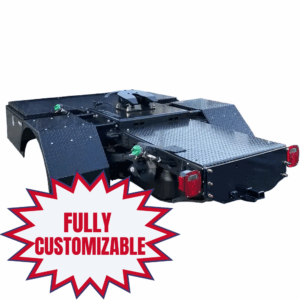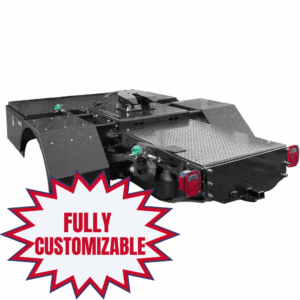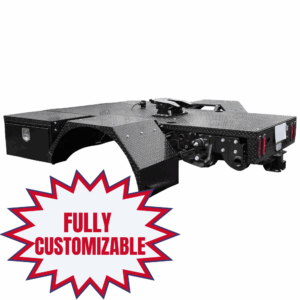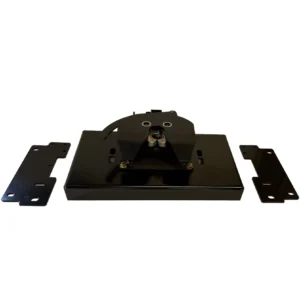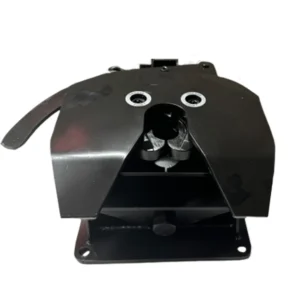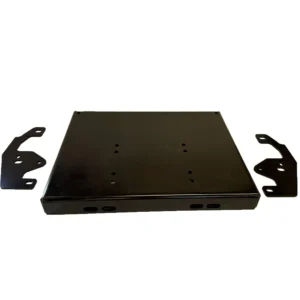
Light commercial hauling, also known as LTL or hot shot trucking, bridges the gap between what consumers can haul with standard-sized towing equipment and full-blown commercial trucking. This industry has gained popularity in the last few years as more drivers venture out on their own but do not want to navigate the expenses and legal complexities of becoming a full-sized commercial trucking company.
For those looking to enter this section of the towing industry, the most common question that most people have is: "What kind of truck do I need to tow?". In this blog, we'll break down the factors in determining what type of truck is best for commercial hauling, and what the max towing capacity is for some of the most commonly seen trucks. Keep in mind, this is only a partial list. You should definitely speak to an expert before making any major decisions. You can always give us a call at (336) 859-3257 to get information about towing capacity.
Hot Shot Hitch Setups for Light Commercial Hauling
Factors that affect towing capacity
Finding the right truck for full-time towing is a little more involved than shopping for a new sedan. Instead of simply choosing a year, make, and model, choosing a truck for hauling means analyzing every aspect of the truck to fully understand it's capabilities.
Engine types
Towing With a Gasoline Truck
While gasoline engines are the standard for a daily commuter, they are quickly left behind when compared to diesel engines for towing purposes. Gasoline by nature is much more combustible than diesel, therefore auxiliary refueling tanks are typically not permitted by law on gasoline vehicles due to the danger of fire and explosion. The life expectancy of a gasoline engine is also much lower than diesel engines, which have been known to drive for a million miles or more with the proper maintenance.
Gasoline - not the industry standard or the most cost effective
Towing With a Diesel Truck
Diesel is by far the most popular choice for professional towing vehicles. According to the U.S. Department of Energy, diesel fuel is about 20% to 30% more efficient than gasoline fuel. This means when considering a tank of gasoline that can power a truck for 400 miles, the same amount of diesel fuel would last for up to 480 miles.
Diesel - engines last longer, refueling abilities with auxiliary tanks, higher towing capacity
Transmission Type
Manual Transmission
Manual transmissions, while less common in modern trucks, still offer certain advantages for towing applications. They provide precise control over gear selection, allowing drivers to optimize power delivery based on load and terrain conditions. Additionally, manual transmissions can offer a more engaging driving experience for some truck enthusiasts.
Automatic Transmission
Automatic transmissions have become the standard choice for many truck buyers, thanks to their ease of use and seamless gear shifting. Modern automatic transmissions can be nearly as efficient as manual transmissions, especially with the inclusion of advanced features like torque converters and multiple gear ratios.
However, it's essential to consider the manufacturer of the automatic transmission when selecting a truck for towing purposes. The reliability and durability of an automatic transmission can vary significantly depending on the manufacturer's design and engineering standards.
Manufacturer Reliability
Just as with any major component, it's crucial to research and consider the reputation of the transmission manufacturer. Some manufacturers have a long-standing track record of producing reliable and durable transmissions that can withstand the rigors of towing heavy loads over extended periods. Most people do not need the improved performance of a towing transmission, so most trucks built by the manufacturer will have a standard transmission.
Allison Transmission is one such manufacturer renowned for its commitment to durability and performance in the commercial trucking industry. Their transmissions are widely regarded for their reliability and construction. They're built to handle heavy-duty towing applications with ease. Trucks equipped with Allison transmissions offer drivers confidence and peace of mind, knowing that their vehicle is equipped with a transmission engineered for reliability and longevity.
Chassis Type
Pickup Truck
In the realm of towing, what makes a pickup truck a pickup truck is not the bed. Trucks that were built to be used as pickup trucks are unique because they use a unique vehicle chassis. You could have two trucks parked right next to each other that look identical from the front, but upon inspection, you would notice that the back half of the trucks are slightly different. This means that the brackets used to install a 5th wheel or goose neck hitch are very different.
This is what we refer to when we ask about whether a vehicle is a pickup truck or a cab and chassis (or chassis cab) truck.
Cab and Chassis (Chassis Cab)
In contrast, cab and chassis vehicles offer a distinct design optimized for commercial hauling applications. These vehicles consist of a cab and an open chassis frame, devoid of a dedicated cargo bed. Cab and chassis trucks are often referred to as "incomplete vehicles" and require additional customization to fulfill specific hauling requirements.
The absence of a pre-defined cargo bed provides flexibility for customization, allowing users to install specialized bodies, such as flatbeds, utility beds, or custom hot shot trucking bodies. Cab and chassis trucks offer superior payload capacity and structural strength compared to traditional pickup trucks, making them well-suited for heavy-duty hauling tasks.
Moreover, cab and chassis vehicles are equipped with reinforced frames and suspension systems designed to withstand the demands of commercial use. The sturdy construction and durability of cab and chassis trucks ensure reliable performance and longevity in rigorous hauling environments.
Cab & Chassis 5th-Wheel Kits for Commercial Frames
-
34K Single Pivot Bolt on Kit
$1,450.00 -
34K Double Pivot Bolt on 5th Wheel Kit
$1,650.00 -
Mounting Plate for Cab and Chassis Trucks
$515.00
Hitch Type
Conventional towing (bumper pull) - lower towing capacity, more dangerous, less control
5th Wheel towing
Higher towing capacity,
less strain on vehicle - load distribution with 5th wheel hitch
Smaller turn radius
Trust the Towing Experts
Understanding truck towing capacity is crucial for hot shot trucking success. By considering engine types, transmission and chassis variations, hitch options, safety protocols, and legal compliance, professionals can make informed decisions to optimize their hauling operations.
At Hitch Crafter, we understand the importance of selecting the right equipment for your towing needs. Whether you're unsure about engine options, transmission types, or chassis configurations, our team of experts is here to help you find the information you need.
Contact us today to have your questions answered and receive personalized assistance in choosing the right hitch for your truck. With our expertise and guidance, you can confidently navigate the complexities of truck towing capacity and propel your hot shot trucking endeavors forward.
Don't let uncertainty hold you back. Reach out to Hitch Crafter and take the first step towards enhancing your towing capabilities and maximizing your hauling efficiency.
Let's get you towing with confidence. Contact us now!
Contact Us
Let's make something special! Provide us with the vehicle information and a short description for what you're looking for. We'll contact you with some ideas to get started.
"*" indicates required fields


